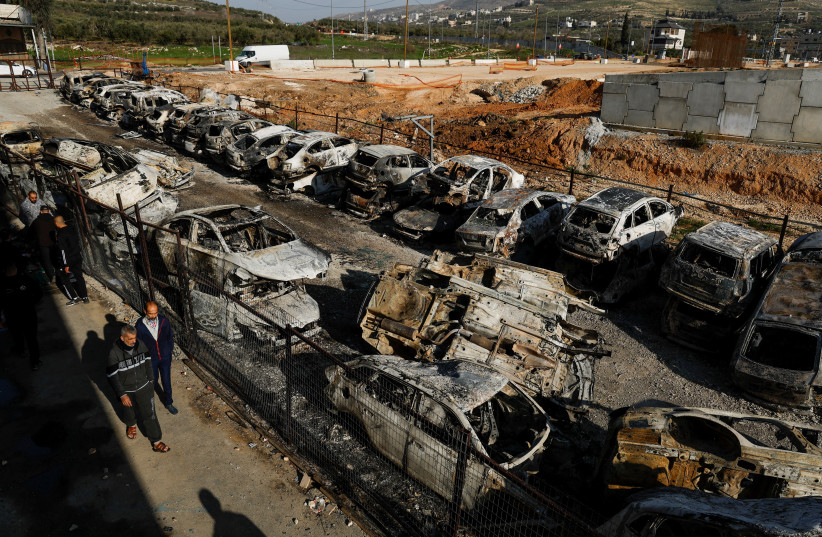The massive arson attack by Jewish residents of the West Bank on Huwara in an apparent attempt to take revenge for a terrorist attack could be a turning point for Israel on key fronts.
The International Criminal Court has been passively probing Israel since 2015 and more actively since early 2021.
One of the key questions about whether it will ever indict Israelis is whether it trusts Israel’s own judicial system to bring to justice those from the Israeli side who perpetrate violence or crimes against Palestinians.
If the ICC finds that Jerusalem properly criminally investigates its own soldiers and citizens who commit violent crimes against Palestinians, it essentially cannot go after Israelis for violence (whether it can go after them for building settlements after 2014 is a completely separate and hotly debated issue).
In Israel, the various forces were playing the blame game, with some sources in the Shin Bet (Israel Security Agency) seeming to blame the IDF or saying anything that is happening is their responsibility. Some IDF sources in turn seemed to lay the blame on the police’s West Bank division. Police sources indicated that responsibility for Huwara is clearly part of the IDF’s zone, something confirmed by the fact that it was the military who later put out a situational assessment to the public.

No one taking responsibility for arson
Part of this is no one wanting to take the blame for a huge arson which should never have happened at all – or at least should have been stopped before it reached such an enormous threshold of people injured and houses burned.
Another part is the unique, confusing mix of authorities in the West Bank, where the Shin Bet, IDF and police all have roles, sometimes overlapping ones.
On paper, these roles are clear and properly sorted, but in the field, who deals with what often depends on who happens to be close by at the time, how many people are involved and how distracted one or another of the security forces are by other events.
In this case, though it should have been apparent that there was a significant risk of retaliation and there have been many past smaller incidents, it seems all of the relevant forces were instead focused on finding the Palestinian terrorist who murdered the two Jews in Huwara earlier in the day.
All of that makes sense and should be a top priority – except that someone at some earlier point needed to take the lead for simultaneous responsibility to prevent the major retaliation that happened.
The only good news is that if Israel properly prosecutes those Jews involved in the violence, it would be a sign to the ICC that the international tribunal should stay out of the Jewish state’s business.
The bad news is that less than 10 of the estimated hundreds of Jewish rioters in Huwara were arrested, and the majority have already been released on bail.
Although the crimes here were clearly ideological and could be framed as dozens of counts of attempted ideological arson, Shin Bet sources passed the ball.
They suggested that the issue was a mere public disturbance of the peace, an issue for the IDF or the police.
But what was different last night in Huwara from the 2015 Duma murders? In Huwara, the Palestinians who were attacked succeeded in escaping from their homes before being killed, while in Duma, most of the family didn’t.
In both cases, Jews used fire to attack Palestinian houses, which could have killed those inside. In fact, given the huge numbers of Palestinians injured and houses burned, one could easily argue that the arson attacks on Huwara were far worse than the Duma incident.
In the Duma incident, the Shin Bet went into overdrive to find the perpetrator, placed multiple Jews in administrative detention for months and used enhanced interrogation against the man who was eventually convicted for the terror murders, Amiram Ben Uliel.
Ben Uliel will spend the rest of his life in jail.
The ICC could do nothing but grudgingly salute Israel in that case.
Of course, things can change in the hours or days to come. But Israel’s initial lack of readiness and lukewarm criminal investigative efforts and signals to date suggest that the ICC may have more issues this time.
The timing could not be worse, given that Israel’s support globally, whether in the US or in the EU, is hitting significant lows. This is due to some global officials’ prior dislike of Prime Minister Benjamin Netanyahu, along with his new announcement regarding settlements, his judicial overhaul campaign and some of his new provocative coalition partners.
Israel will at some point probably face a negative ruling against it by the International Court of Justice regarding its handling of Palestinian issues.
Then again, from the reactions of multiple leaders in the coalition, it is not clear that they care very much about the impact on the ICC and the International Court of Justice (ICJ), and it is even unclear how much they care about US and EU criticism – as long as they please their domestic constituencies.
